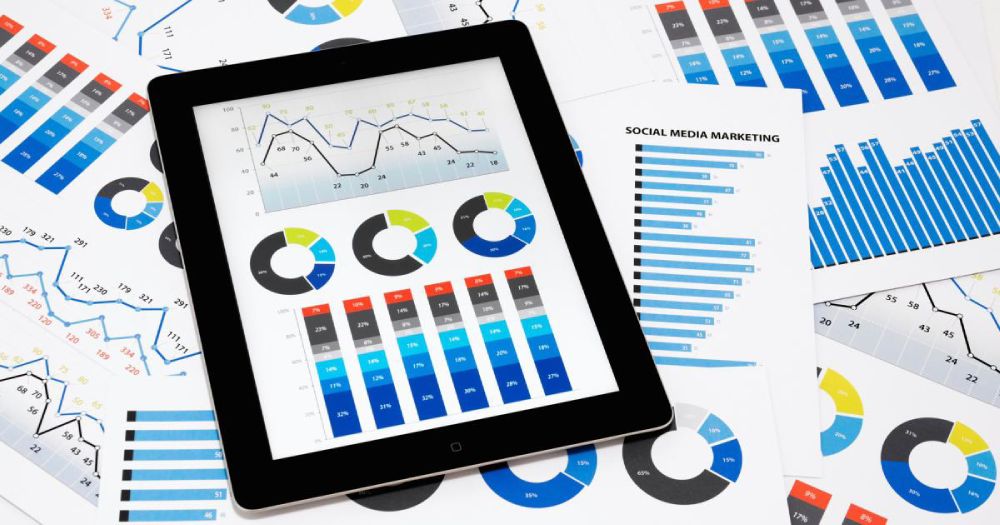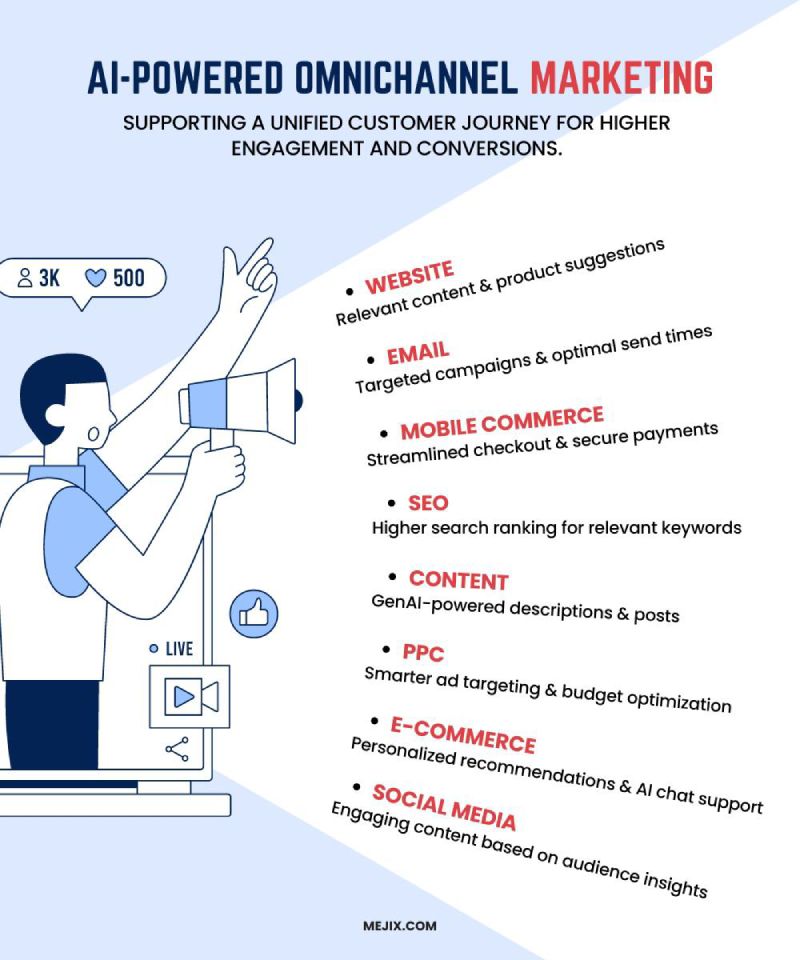Omnichannel Marketing in 2024 – AI-Driven E-Commerce Solutions
User experience lies at the core of any successful marketing strategy. Omnichannel marketing, which integrates touchpoints across all channels, is the key to achieving a satisfying and seamless customer journey.
In 2024, AI-driven e-commerce solutions will transform how businesses implement omnichannel strategies. Today, we explore how AI is integrated into different aspects of omnichannel marketing and why it enhances personalization, efficiency, and customer satisfaction.
What is Omnichannel Marketing?
Omnichannel marketing creates a unified and consistent customer experience by integrating and coordinating various marketing channels.
Unlike multichannel marketing, which operates on multiple platforms independently, omnichannel marketing ensures that all channels work together harmoniously, providing consistent messaging, product information, and promotions.
This approach enables customers to interact seamlessly with a brand, whether they are shopping online, using a mobile app, or visiting a physical store.
The USA is at the forefront of the global omnichannel retail market, accounting to more than 30.2% in 2022, while the global omnichannel market continues to grow worldwide, and is expected to reach $19 bn in 2030.
Research shows that omnichannel marketing attracts a significantly larger engagement and purchase rate than single channel campaigns, as well as a higher customer retention.
The Rise of AI-Driven E-Commerce

In today’s digital landscape, understanding AI and its applications in e-commerce is critical to success. In just a few years, AI-driven tools have transformed how businesses operate and interact with customers.
By leveraging advanced technologies such as machine learning, natural language processing, and data analytics, AI enables businesses to gain deeper insights into customer behavior, preferences, and trends.
These insights allow for more personalized and efficient marketing strategies, enhancing the overall customer experience. So, it’s no wonder AI-powered tools are some of the most important e-commerce trends in 2024.
How AI Benefits Omnichannel Marketing

Omnichannel marketing requires a cohesive strategy rooted in customer insights and data analytics. Thanks to AI’s advanced capabilities, this customer-centric approach can be taken to a whole new level.
Here are some of the main advantages of integrating AI into your omnichannel marketing strategy:
- Advanced Personalization: AI algorithms analyze customer data to provide highly personalized content, targeted promotions, and custom recommendations across all channels.
- Efficiency and Automation: AI automates various marketing tasks, such as e-mail campaigns, social media posts, and customer segmentation, freeing up valuable time for marketers.
- Real-Time Insights: AI tools provide real-time analytics and insights, allowing businesses to adjust their strategies on the fly to meet customer needs and provide a competitive edge.
- Optimized Marketing Strategies: AI can identify trends and customer preferences, allowing businesses to optimize their marketing campaigns for maximum reach and ROI across all channels.
- Enhanced Customer Experience: AI-driven solutions ensure a consistent and engaging customer experience across all touchpoints, including customer service and UI/UX.
How to Integrate AI in Omnichannel Marketing

Let’s look at how AI-driven tools can be implemented for a successful omnichannel marketing strategy:
Custom Websites
AI-driven websites are central to an effective omnichannel strategy. These websites personalize content and product recommendations based on user behavior and preferences by leveraging machine learning algorithms.
For example, Amazon’s recommendation engine suggests products based on a user’s browsing and purchase history, enhancing engagement and conversion rates.
AI can also assist in custom website development by designing intuitive and engaging user interfaces, ensuring a consistent look and feel across all digital channels.
E-Mail Marketing
AI-driven e-mail marketing uses machine learning to analyze customer data and predict the best times to send e-mails, the type of content that resonates with different segments, and the subject lines that will yield the highest open rates.
Mailchimp’s AI tools help businesses create personalized e-mail campaigns that adapt based on recipient interactions, improving engagement and conversion rates.
SEO
AI-driven SEO tools analyze search trends, user intent, and website performance to provide actionable insights. These tools help businesses optimize their content for better search engine visibility.
For instance, tools like SEMrush use AI to suggest keyword optimizations and content improvements, ensuring that customers can find businesses quickly regardless of the channel they are using.
PPC
AI algorithms optimize Pay-Per-Click (PPC) advertising by adjusting ad placements and bids in real time. This ensures that PPC campaigns are cost-effective and reach potential customers across multiple channels.
Google Ads utilizes AI to automate bid adjustments and target ads more effectively, enhancing the overall efficiency of paid advertising strategies.
Social Media Marketing
Social Media Marketing (SMM) benefits significantly from AI tools that analyze social media trends, user engagement, and sentiment. AI-driven SMM can automate post-scheduling, manage interactions, and measure performance.
Tools like Hootsuite and Sprout Social use AI to provide insights on the best times to post and the type of content that resonates most with the audience, ensuring a consistent and engaging social media presence.
Content Creation
AI-driven content creation is becoming commonplace thanks to Generative AI apps like ChatGPT. Marketers can generate different types of content, such as product descriptions, blog posts, and social media captions. This can save businesses time and resources while ensuring the content is relevant and optimized for search engines.
E-Commerce Stores
AI-driven e-commerce stores offer personalized and streamlined shopping experiences. AI algorithms recommend products based on individual customer behavior, manage inventory, and optimize pricing.
Shopify uses AI powered tools to recommend products and optimize sales strategies. At the same time, AI chatbots like those offered by Drift provide instant customer support, guiding customers through their shopping journey seamlessly across all channels.
Mobile Commerce
Mobile commerce (m-commerce) is a critical component of omnichannel marketing, and AI is pivotal in enhancing mobile shopping experiences.
AI-driven mobile apps can provide personalized shopping experiences, tailored product recommendations, and seamless payment options.
Additionally, AI-powered mobile wallets like Apple Pay and Google Wallet provide secure and convenient payment options, making mobile transactions smoother and more efficient.
Conclusion
In 2024, AI-driven e-commerce solutions are essential for effective omnichannel marketing. By integrating AI into custom websites, e-mail marketing, SEO, PPC, SMM, e-commerce stores, mobile commerce, and custom e-commerce development, businesses can offer advanced personalization, optimize their marketing efforts, and provide a seamless customer experience across all platforms.
Staying updated with the latest trends and continually refining strategies based on AI insights will be vital to thriving in the dynamic e-commerce landscape.
Mejix – Delivering Custom E-Commerce Development Solutions
Custom e-commerce development, powered by AI, is creating unique and highly efficient online stores tailored to specific business needs.
At Mejix, we harness the power of the latest technologies to develop e-commerce solutions suited to your business requirements.
From bespoke software development to custom Shopify stores and digital marketing, we deliver solutions to help you stay competitive and create meaningful customer interactions.
Reach out with your project, and let’s get the sales rolling!












